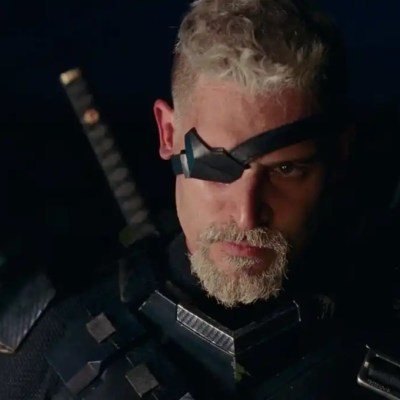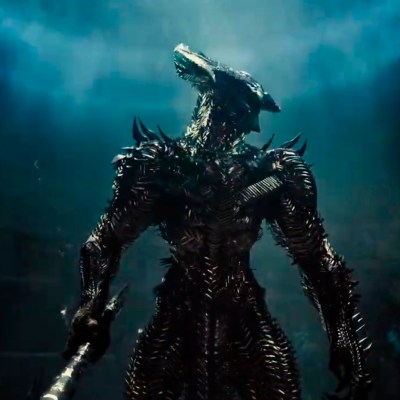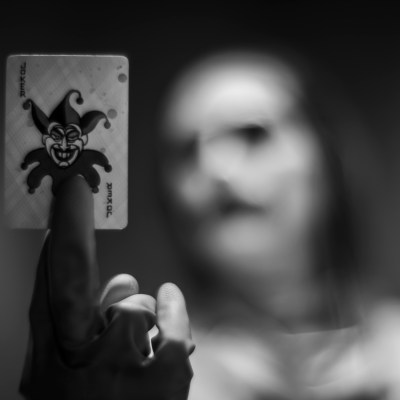Zack Snyder’s Justice League: Joker Epilogue Explained
Jared Leto's Joker returns in a creepy epilogue to Zack Snyder's Justice League. Here's what his bizarre conversation with Batman means...
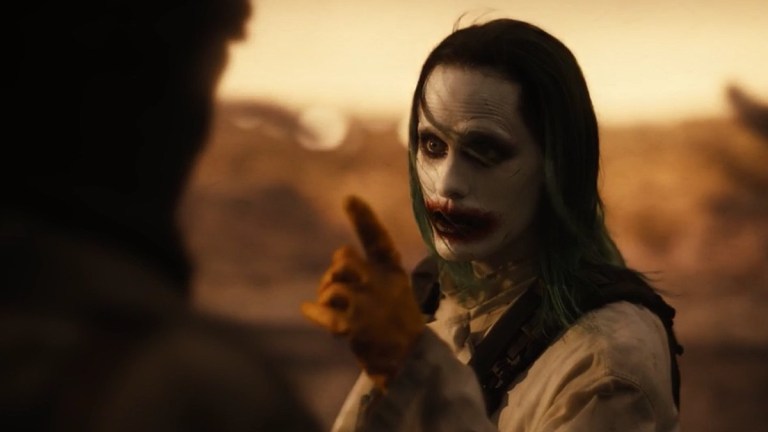
This Zack Snyder’s Justice League article contains spoilers.
Despite the heroes’ best efforts throughout the four-hour epic, Zack Snyder’s Justice League still ends in scorched earth, with Darkseid’s forces decimating whatever’s left of the planet’s surface, turning it into a wasteland. Even after defeating Steppenwolf and preventing the disaster of Unity, it’s still not enough to stop what’s been coming to Snyder’s version of the DCEU since Bruce had his first “Knightmare” in Batman v Superman: Dawn of Justice. Or so it seems in an almost 10-minute-long epilogue, which includes a cameo from Jared Leto’s Joker especially shot for the Snyder Cut.
Joker’s inclusion in the movie might seem jarring to some, considering he has no bearing on the actual story being told for most of the film’s runtime. In fact, you could pretty much skip the epilogue completely and not lose much of the experience if you’re only watching for the main plot. That said, the tense conversation between Batman and Joker — as they look upon what Darkseid’s wrought on their planet — does raise some interesting questions as to what might be next for these archnemeses were Snyder to get yet another shot at the DCEU.
Ironically, Snyder actually shot the brand-new footage for Leto specifically because he thought he’d never get another chance to work with these characters. The director “couldn’t leave this universe without having a Joker/Batman scene,” according to producer Deborah Snyder in an interview with CBR. But shooting the scene in the middle of a pandemic was tricky: it involved sending a truck full of costumes to Leto’s house, who would then try them on for the director during Zoom calls to see what worked. According to Deborah, “there was a lot of Zooming and photos and things like that, but so much thought went into creating the character.”
This might explain why the “Joker Christ” look — a version of the villain wearing a crown of thorns featured in a Vanity Fair article — didn’t actually appear in the movie. It was likely one of the costume ideas that were nixed before filming. Something similar happened with Leto’s now-infamous “We live in a society” line in one of the trailers for the Snyder Cut, which the director says was ad-libbed by Leto himself while filming the epilogue. As you now know, that line is nowhere to be found in the scene, either.
So, what did make it into the epilogue? How did Snyder use his final chance to have these versions of Batman and Joker meet in a DCEU movie?
The Batman/Joker History
For one thing, Snyder touches on some very familiar elements of their dynamic. Like with past iterations of this relationship, Ben Affleck’s Dark Knight and Leto’s Joker are truly inseparable. Even when faced with the end of the world, when all bets are off and the rules no longer apply, the hero and the villain still decide to team up instead of settling the score once and for all. Joker is especially cognizant of their connection, mentioning how Batman created him and how his beloved Bat now needs him to undo what Darkseid did, even though it’s unclear just what the clown can do against such insurmountable, cosmic odds.
Bruce’s threat that he’ll eventually kill Joker is a particularly weak one when he’s also welcomed the Clown Prince of Crime onto his team, and equipped him with a bulletproof vest and an assault rifle no less. Their tense back and forth in this scene is just another section of their eternal dance, even as the Joker dares Batman to kill him. But if Bats were to give in to the temptation and end the clown’s life, who would be there to give him a reach–
Harley Quinn is Dead
We learn a few other things from their brief conversation (and one has to wonder why they’ve decided to do this in the open where they can be spotted by Darkseid’s parademons or Evil Superman): Harley Quinn has died in this possible future, but not before expressing her true hatred for Mr. J. Whether it was always the plan for Harley to break away from her insane beau in time for Birds of Prey or Snyder was trying to connect the dots after the fact is unclear. But her death is clearly a particularly sore spot for Joker, who for a second seems to want to break his own proposed truce and take a shot at the Batman.
“You’re good,” Joker finally says when he regains his cool, realizing the Dark Knight wants the clown to give him a reason to put him down for good. Self-defense ain’t the same as murder in the Snyderverse, right?
The Death of Robin
Robin’s death is finally addressed with one of the coldest lines in the entire epilogue: “I’m happy to discuss in any way you like, why you sent a Boy Wonder to do a man’s job?” the Joker asks Batman. This is in reference to a couple of things. The vandalized Robin suit displayed in the Batcave is a stark reminder of what is likely Bruce’s biggest failure in this universe, but we’ve never actually learned how the Boy Wonder died despite the references to the meteoric death sprinkled across Snyder’s earlier DCEU work. We know the clown did it but not how (perhaps for the best) or the events that led up to Robin’s death.
But that single line of dialogue delivered by the Joker suggests that some version of the 1988 comic book storyline “Death in the Family” has happened in this universe. In those comics, Robin (the second one, Jason Todd) goes off on his own to find his biological mother against Batman’s wishes, and instead comes face to face with the Joker, who murders him in extremely gruesome fashion. It’s a death that haunts Bruce as much as the deaths of his parents, which Leto’s Joker also references, along with Batman’s real name.
Batman Must Die
Most importantly, the epilogue seems to exist so that the Joker can plant a seed in Batman’s head: only his own self-sacrifice will be enough to stop Darkseid once and for all. This is a storyline that Snyder had planned to explore further in future Justice League sequels, a proposed trilogy that would have culminated with the Dark Knight’s death and the rise of a new Caped Crusader.
It’s unlikely that we’ll ever see this trilogy now that Snyder and the DCEU are parting ways, but the epilogue leaves the road clear for a sequel nonetheless, with Joker alluding to a time-travel plot that would involve Batman’s new crew going back in time to undo Lois Lane’s death and Superman’s villainous turn.
The DC Comics Inspirations
This is hardly the first time the Dark Knight and the Clown Prince of Crime have joined forces to fight a greater evil. Most recently, they’ve teamed up in the DC comics by Scott Snyder and Greg Capullo, particularly in Dark Nights: Metal and Last Knight on Earth, post-apocalyptic stories set in nightmarish wastelands that the director might have at least skimmed while writing this epilogue. In both of these stories, Joker is a key part of Batman’s ultimate victory. In Last Knight on Earth, Joker even finally become’s his “best friend”‘s sidekick.
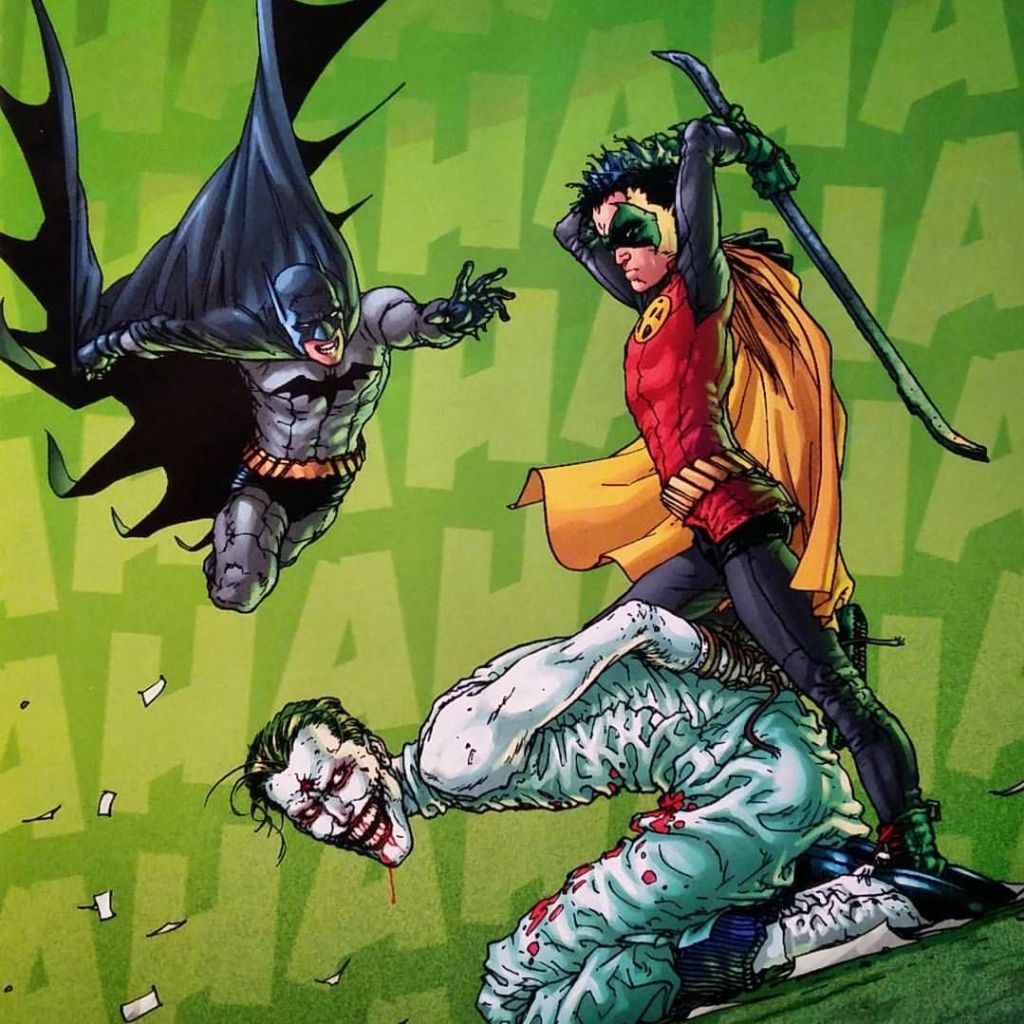
But in terms of what inspired the grungier look of Justice League‘s Joker, it seems that the filmmaker and Leto went back to the Grant Morrison era of the character for inspiration. Just as Morrison and Tony Daniel’s “reborn” Joker was a clear influence on Leto’s get-up in Suicide Squad, the jarring butcher (?) costume worn by the clown in the epilogue might have been inspired by a similar look introduced in Morrison’s Batman and Robin series (above). Either way, it’s a very odd fashion choice when you’re about to go fight a New God, but then again, Joker isn’t exactly your average dresser.
With this Batman and Joker scene, Snyder reaffirms his love for these characters. Regardless of whether you find his take on their relationship worthy or not, it’s impossible to deny Snyder’s attention to detail when crafting his final DCEU scene, one full of references to Batman and the Joker’s past as well as their potential future. In his own divisive way, Snyder writes a love letter to these characters and goes out with a smile.

